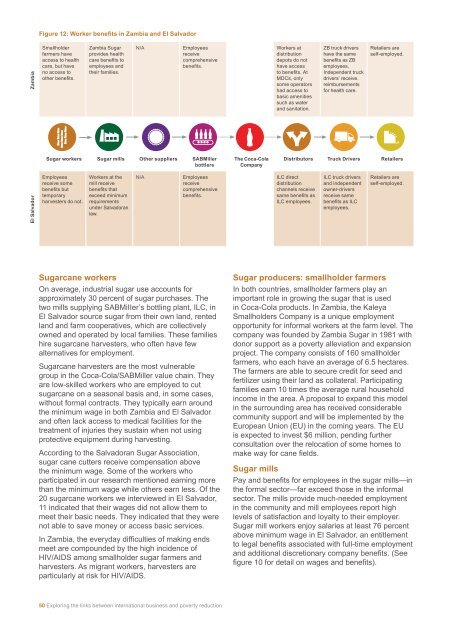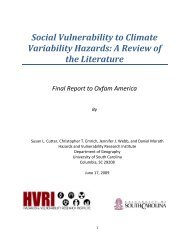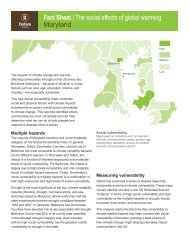Poverty Footprint Study on how the Coca Cola - Oxfam America
Poverty Footprint Study on how the Coca Cola - Oxfam America
Poverty Footprint Study on how the Coca Cola - Oxfam America
Create successful ePaper yourself
Turn your PDF publications into a flip-book with our unique Google optimized e-Paper software.
Zambia<br />
El Salvador<br />
Figure 12: Worker benefits in Zambia and El Salvador<br />
Smallholder<br />
farmers have<br />
access to health<br />
care, but have<br />
no access to<br />
o<strong>the</strong>r benefits.<br />
Zambia Sugar<br />
provides health<br />
care benefits to<br />
employees and<br />
<strong>the</strong>ir families.<br />
Sugarcane workers<br />
N/A Employees<br />
receive<br />
comprehensive<br />
benefits.<br />
Sugar workers Sugar mills O<strong>the</strong>r suppliers SABMiller<br />
bottlers<br />
Employees<br />
receive some<br />
benefits but<br />
temporary<br />
harvesters do not.<br />
Workers at <strong>the</strong><br />
mill receive<br />
benefits that<br />
exceed minimum<br />
requirements<br />
under Salvadoran<br />
law.<br />
N/A Employees<br />
receive<br />
comprehensive<br />
benefits.<br />
On average, industrial sugar use accounts for<br />
approximately 30 percent of sugar purchases. The<br />
two mills supplying SABMiIIer’s bottling plant, ILC, in<br />
El Salvador source sugar from <strong>the</strong>ir own land, rented<br />
land and farm cooperatives, which are collectively<br />
owned and operated by local families. These families<br />
hire sugarcane harvesters, who often have few<br />
alternatives for employment.<br />
Sugarcane harvesters are <strong>the</strong> most vulnerable<br />
group in <strong>the</strong> <strong>Coca</strong>-<strong>Cola</strong>/SABMiller value chain. They<br />
are low-skilled workers who are employed to cut<br />
sugarcane <strong>on</strong> a seas<strong>on</strong>al basis and, in some cases,<br />
without formal c<strong>on</strong>tracts. They typically earn around<br />
<strong>the</strong> minimum wage in both Zambia and El Salvador<br />
and often lack access to medical facilities for <strong>the</strong><br />
treatment of injuries <strong>the</strong>y sustain when not using<br />
protective equipment during harvesting.<br />
According to <strong>the</strong> Salvadoran Sugar Associati<strong>on</strong>,<br />
sugar cane cutters receive compensati<strong>on</strong> above<br />
<strong>the</strong> minimum wage. Some of <strong>the</strong> workers who<br />
participated in our research menti<strong>on</strong>ed earning more<br />
than <strong>the</strong> minimum wage while o<strong>the</strong>rs earn less. Of <strong>the</strong><br />
20 sugarcane workers we interviewed in El Salvador,<br />
11 indicated that <strong>the</strong>ir wages did not allow <strong>the</strong>m to<br />
meet <strong>the</strong>ir basic needs. They indicated that <strong>the</strong>y were<br />
not able to save m<strong>on</strong>ey or access basic services.<br />
In Zambia, <strong>the</strong> everyday difficulties of making ends<br />
meet are compounded by <strong>the</strong> high incidence of<br />
HIV/AIDS am<strong>on</strong>g smallholder sugar farmers and<br />
harvesters. As migrant workers, harvesters are<br />
particularly at risk for HIV/AIDS.<br />
50 Exploring <strong>the</strong> links between internati<strong>on</strong>al business and poverty reducti<strong>on</strong><br />
The <strong>Coca</strong>-<strong>Cola</strong><br />
Company<br />
Workers at<br />
distributi<strong>on</strong><br />
depots do not<br />
have access<br />
to benefits. At<br />
MDCs, <strong>on</strong>ly<br />
some operators<br />
had access to<br />
basic amenities<br />
such as water<br />
and sanitati<strong>on</strong>.<br />
ZB truck drivers<br />
have <strong>the</strong> same<br />
benefits as ZB<br />
employees,<br />
Independent truck<br />
drivers’ receive.<br />
reimbursements<br />
for health care.<br />
Retailers are<br />
self-employed.<br />
Distributors Truck Drivers Retailers<br />
ILC direct<br />
distributi<strong>on</strong><br />
channels receive<br />
same benefits as<br />
ILC employees.<br />
ILC truck drivers<br />
and independent<br />
owner-drivers<br />
receive same<br />
benefits as ILC<br />
employees.<br />
Retailers are<br />
self-employed.<br />
Sugar producers: smallholder farmers<br />
In both countries, smallholder farmers play an<br />
important role in growing <strong>the</strong> sugar that is used<br />
in <strong>Coca</strong>-<strong>Cola</strong> products. In Zambia, <strong>the</strong> Kaleya<br />
Smallholders Company is a unique employment<br />
opportunity for informal workers at <strong>the</strong> farm level. The<br />
company was founded by Zambia Sugar in 1981 with<br />
d<strong>on</strong>or support as a poverty alleviati<strong>on</strong> and expansi<strong>on</strong><br />
project. The company c<strong>on</strong>sists of 160 smallholder<br />
farmers, who each have an average of 6.5 hectares.<br />
The farmers are able to secure credit for seed and<br />
fertilizer using <strong>the</strong>ir land as collateral. Participating<br />
families earn 10 times <strong>the</strong> average rural household<br />
income in <strong>the</strong> area. A proposal to expand this model<br />
in <strong>the</strong> surrounding area has received c<strong>on</strong>siderable<br />
community support and will be implemented by <strong>the</strong><br />
European Uni<strong>on</strong> (EU) in <strong>the</strong> coming years. The EU<br />
is expected to invest $6 milli<strong>on</strong>, pending fur<strong>the</strong>r<br />
c<strong>on</strong>sultati<strong>on</strong> over <strong>the</strong> relocati<strong>on</strong> of some homes to<br />
make way for cane fields.<br />
Sugar mills<br />
Pay and benefits for employees in <strong>the</strong> sugar mills—in<br />
<strong>the</strong> formal sector—far exceed those in <strong>the</strong> informal<br />
sector. The mills provide much-needed employment<br />
in <strong>the</strong> community and mill employees report high<br />
levels of satisfacti<strong>on</strong> and loyalty to <strong>the</strong>ir employer.<br />
Sugar mill workers enjoy salaries at least 76 percent<br />
above minimum wage in El Salvador, an entitlement<br />
to legal benefits associated with full-time employment<br />
and additi<strong>on</strong>al discreti<strong>on</strong>ary company benefits. (See<br />
figure 10 for detail <strong>on</strong> wages and benefits).




